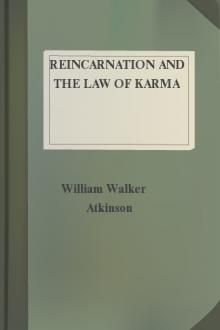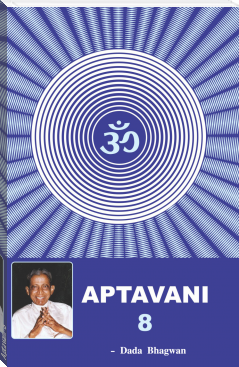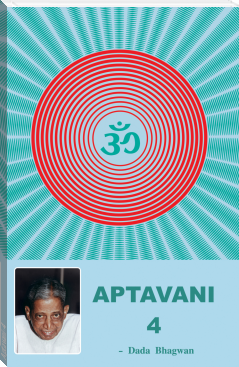Reincarnation and the Law of Karma - William Walker Atkinson (pocket ebook reader .txt) 📗

- Author: William Walker Atkinson
- Performer: -
Book online «Reincarnation and the Law of Karma - William Walker Atkinson (pocket ebook reader .txt) 📗». Author William Walker Atkinson
The second objection usually made is that Reincarnation cannot be true, else we would remember the incidents of our past lives, clearly and distinctly, the fact that the majority of persons have no such recollection, being held to be a disproof of the doctrine. The reply to this objection is (1) that it is not true that people do not remember the events of their past lives, the instances quoted by us, and similar ones happening to others, together with the fact that nearly every one remembers something of the past, showing that the objection is not correctly stated. And (2) that the fact that we have but a very cloudy and imperfect recollection is not an objection at all, for have we a clear recollection of the events of our infancy and childhood in this life? Have we a clear recollection of the events of twenty years ago, outside of a few scattered instances, of which the majority are only recalled when some associated fact is mentioned? Are not the great majority of the events of our present life completely forgotten? How many can recall the events of the youthful life? Old companions and friends are completely forgotten or only recalled after much thought and assistance in the way of suggested associations. Then again, do we not witness a complete forgetfulness in cases of very old people who relapse into a state of "second childhood," and who then live entirely in the present, the past having vanished for them. There are cases of people having grown old, and while retaining their reasoning faculties, were as children, so far as the past was concerned. A well-known writer, when in this state, was wont to read the books that he had written, enjoying them very much and not dreaming that he was their author. Professor Knight says of this matter: "Memory of the details of the past is absolutely impossible.
"The power of the conservative faculty, though relatively great, is extremely limited. We forget the larger portion of experience soon after we have passed through it, and we should be able to recall the particulars of our past years, filling all the missing links of consciousness since we entered on the present life, before we were in a position to remember our ante-natal experience. Birth must necessarily be preceded by crossing the river of oblivion, while the capacity for fresh acquisition survives, and the garnered wealth of old experience determines the amount and characters of the new." Loss of memory is not loss of being—or even loss of individuality or character.
In this connection, we must mention the various instances of Double Personality, or Lost Personality, noted in the recent books on Psychology. There are a number of well authenticated cases in which people, from severe mental strain, overwork, etc., have lost the thread of Personality and forgotten even their own names and who have taken up life anew under new circumstances, which they would continue until something would occur to bring about a restoration of memory, when the past in all of its details would come back in a flash. The annals of the English Society for Psychical Research contain quite a number of such cases, which are recognized as typical. Now, would one be justified in asserting that such a person, while living in the secondary personality and consequently in entire ignorance of his past life, had really experienced no previous life? The same "I" was there—the same Ego—and yet, the personality was entirely different! Is it not perfectly fair and reasonable to consider these cases as similar to the absence of memory in cases of Reincarnation?
Let the reader lay down this book, and then endeavor to remember what happened in his twelfth year. He will not remember more than one or two, or a half dozen, events in that year—perhaps not one, in the absence of a diary, or perhaps even with the aid of one. The majority of the happenings of the three hundred and sixty-five days of that year are as a blank—as if they never had happened, so far as the memory is concerned. And yet, the same "I," or Ego, persists, and the person's character has certainly been affected and influenced by the experiences and lessons of that year. Perhaps in that year, the person may have acquired certain knowledge that he uses in his everyday life. And so, in this case, as with Reincarnation, the "essence" of the experiences are preserved, while the details are forgotten. For that is the Reincarnationist contention. As a matter of fact, advanced occultists, and other Reincarnationists, claim that nothing is really forgotten, but that every event is stored away in some of the recesses of the mind, below the level of consciousness--which idea agrees with that of modern psychologists. And Reincarnationists claim that when man unfolds sufficiently on some higher plane, he will have a full recollection of his past experiences in all of his incarnations. Some Reincarnationists claim that as the soul passes from the body all the events of that particular life pass rapidly before its mind, in review, before the waters of Lethe, or oblivion, causes forgetfulness.
Closely allied to the last mentioned argument against Reincarnation is the one that as the memory of the past life is absent, or nearly so, the new personality is practically a new soul, instead of the old one reincarnated, and that it is unreasonable and unjust to have it enjoy or suffer by reasons of its experiences and acts in the previous life. We think that the answers to the last mentioned objection are answers to this one also. The "I," Ego, or Individuality, being the same, it matters not if the details of the old Personality be forgotten. You are the same "I" that lived fifty years ago in the same body —or even ten years ago—and you are enjoying certain things, or suffering from certain things, done or left undone at the previous time, although you have forgotten the incidents. The impress of the thing is on your Character, and you are today largely what you are by reason of what you have been in past years, though those years are forgotten by you. This you will readily admit, and yet the argument of the Reincarnationists is merely an extension of the same idea. As Figuier says: "The soul, in spite of its journeys, in the midst of its incarnations and divers metamorphoses remains always identical with itself; only at each metempsychosis, each metamorphosis of the external being, improving and purifying itself, growing in power and intellectual grasp."
Another argument against Reincarnation is that it is not necessary, for the reason that Heredity accounts for all of the facts claimed as corroborative of Reincarnation. Answering this the advocates of the doctrine insist that Heredity does not account for all the facts, inasmuch as children are born with marked talents and genius, while none of their family for generations back have displayed any such tendencies. They also claim that if Heredity were the only factor in the case, there would be no advance in the races, as the children would be precisely like their ancestors, no variety or improvement being possible. But it must be remembered that Reincarnationists do not deny certain effects of Heredity, particularly along physical lines, and to an extent along mental lines, in the way of perpetuating "tendencies," which, however, are and may be overcome by the individuality of the child. Moreover, the doctrine holds that one of the laws of Rebirth is that the reincarnating soul is attracted to parents harmonious to itself, and likely to afford the environments and association desirable to the soul. So in this way the characteristics likely to be transmitted to the offspring are those which are sought for and desired by the reincarnating soul. The law of Rebirth is held to be as exact and certain as the laws of mathematics or chemistry, the parents, as well as the child, forming the combination which brings forth the rebirth. Rebirth is held to be above the mere wish of the reincarnating soul—it is in accordance with an invariable natural law, which has Justice and Advancement as its basis.
Another argument against Reincarnation is that it holds that human souls are reborn as animals, in some cases. This objection we shall not discuss, for the reason that the advanced ideas of Reincarnation expressly forbid any such interpretation, and distinctly deny its legitimate place in the doctrine. Among some of the primitive people this idea of transmigration in the bodies of animals has been held, but never among advanced occultists, or the leaders in philosophical thought favoring Reincarnation. Reincarnation teaches the Evolution of the soul from lowly forms to higher, but never the Devolution or going back into animal forms. A study of the doctrine of Reincarnation will dispel this erroneous idea from the mind of an intelligent person.
Another favorite argument is that it is repulsive to the mind and soul of the average person. Analysis of this objection will show that what is repugnant to the person is usually the fear that he will be born again without a memory of the present, which seems like a loss of the self. A moment's consideration will show that this objection is ill founded. No one objects to the idea of living in the same body for, say, ten years or twenty years more, in health. But at the end of that ten or twenty years he will be practically a different person, by reason of the new experiences he has undergone. Persons change very much in twenty years, and yet they are the same individuals—the same "I" is there with them. And at the end of the twenty years they will have forgotten the majority of the events of the present year, but they do not object to that. When one realizes that the Individual, or "I," is the Real Self instead of the Personality, or the "John Smith, grocer, aged 36," part of them—then will they cease to fear the loss of the personality of the day or year. They will know that the "I" is the "Self"—the same yesterday, today and tomorrow. Be the doctrine of Reincarnation true or false, the fact remains that so long as YOU exist, it will be the same "I" in you that you will know that "I am." It will always be "I AM—HERE—NOW," with you, be it this moment, or a hundred years, or a million years hence. YOU can never be SOMEONE ELSE, no matter what form you wear, nor by what name you are known, nor what personality you may be acting through, nor in what place you may have your abode, nor on





Comments (0)